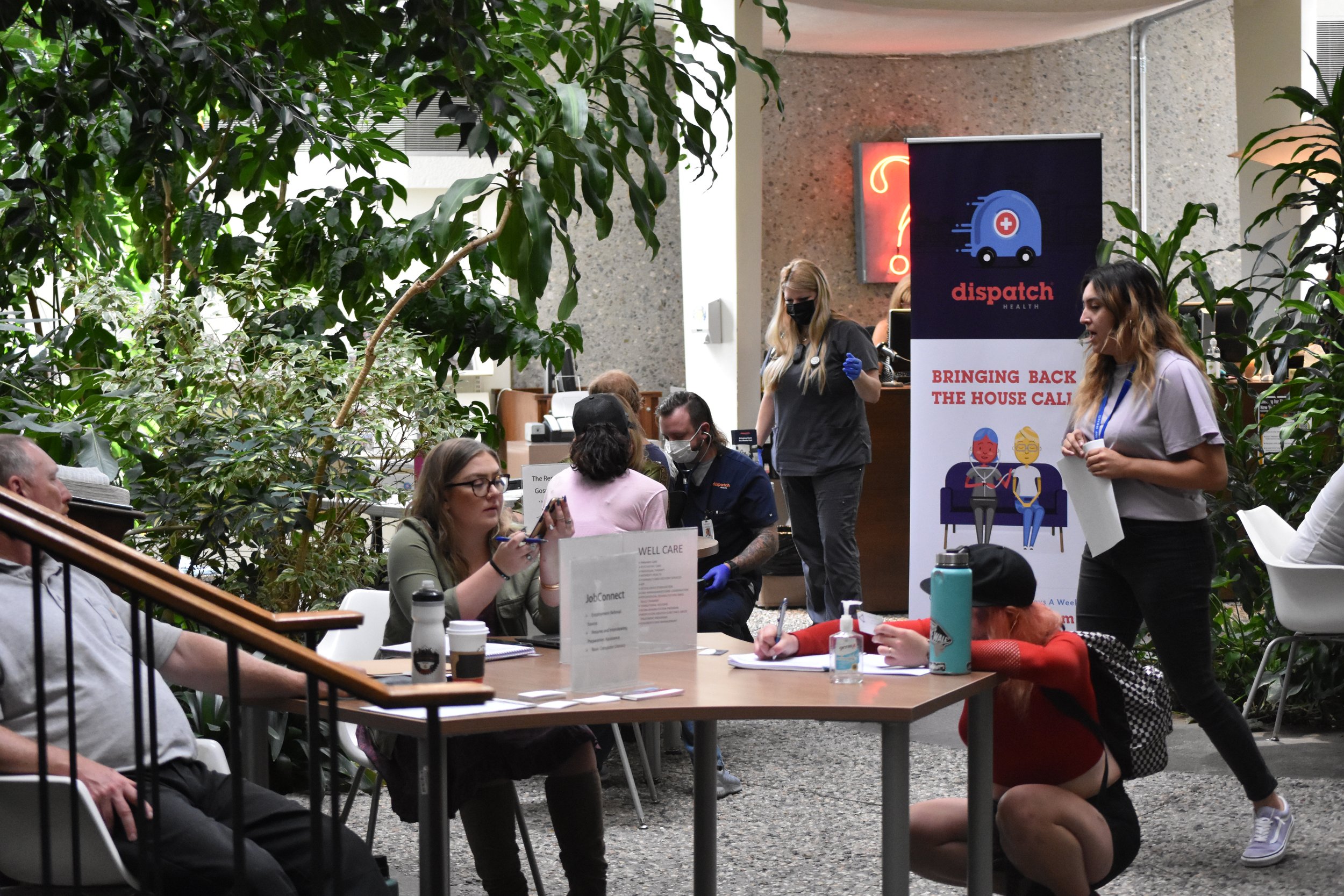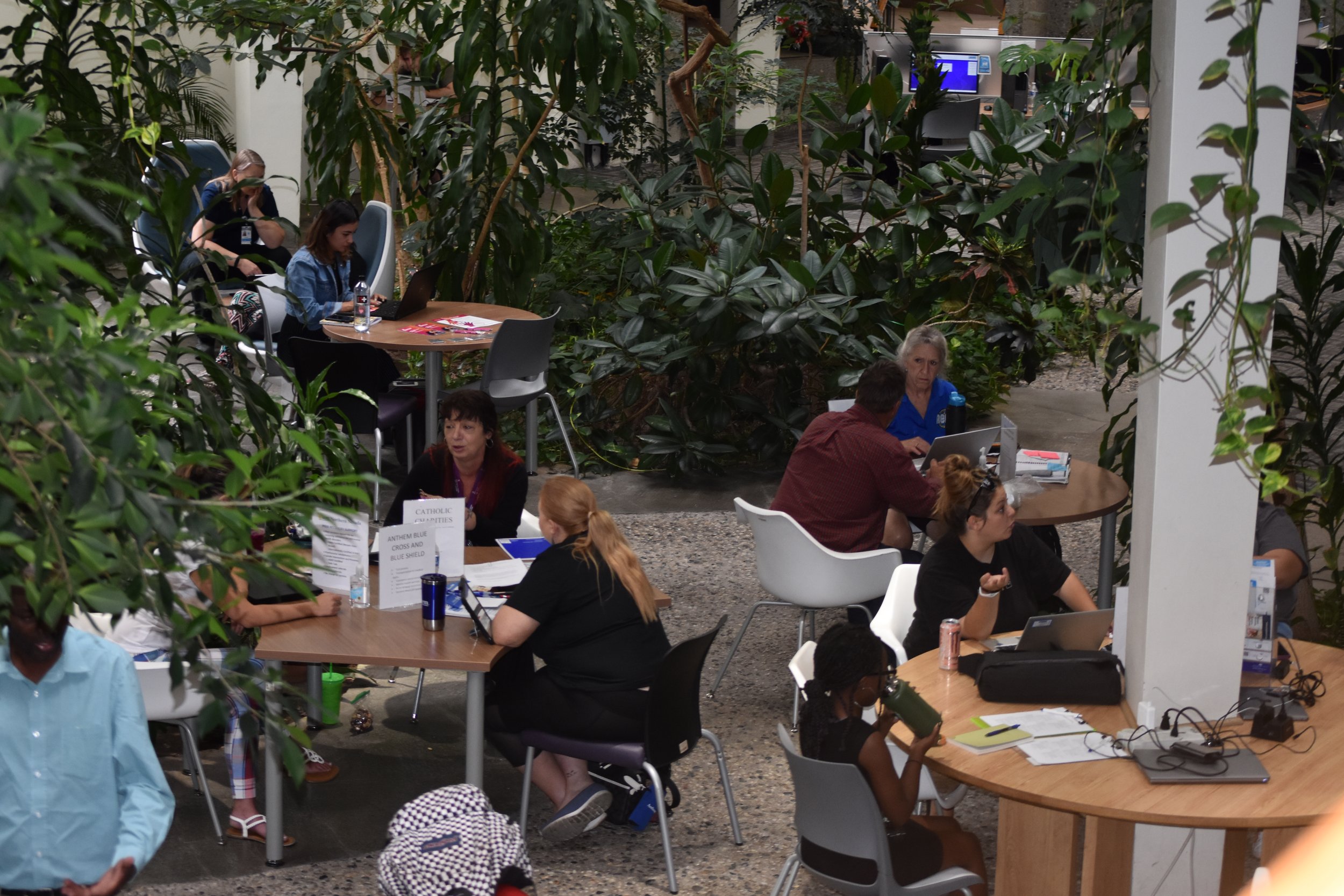Every Wednesday morning, amidst the green foliage that fills the rooms and engulfs the Downtown Reno Library, the Reno Community Court is in session.
Security guards search people, individuals file down staircases, packed lunches are handed out, coffee is drunk, brochures are passed from hand to hand. The weekly session run by Reno’s Municipal Court provides resources and services to a large population of people – most of whom are unhoused individuals – instead of jail time and fines for minor offenses.
“Quality-of-life offenses” are misdemeanors and non-violent crimes such as open containers, urinating in public, trespassing, loitering, disorderly conduct. The majority of these citations are often given to those living on the streets. Instead of sending offenders directly to jail or Municipal Court, Reno Police or Washoe County Park Rangers can give the offender the option of going to this Community Court instead. Offenders for their part can participate, get help and have their community service hours and fines suspended, or receive traditional punishment.
When an individual comes to Community Court for their first offense, they are checked in at the entrance. There is a list of names of the people expected to attend, however individuals are free to come even if they aren’t on the list. These are “service-only” individuals; people who haven’t committed a misdemeanor, but who just want to access help and assistance.
The individual will then meet with a social worker who completes an initial risk assessment and with a case worker who delves further into the individual’s needs. Depending on what’s at stake, they will have the opportunity to visit tables and speak to the many service providers present. The service providers offer assistance in all different sectors; employment, resume building, getting a government-issued ID, clothing, food, substance abuse counseling, mental health, medical and insurance assistance.
The myriad of different services is important since every individual, and thus their needs, are very different, as well as constantly changing.
Marie Krueger, a service provider from the Reno-Sparks Gospel Mission, explained to Our Town Reno the importance of having so many services available. As well as handing out food, clothing, and furniture to those who need it, the RSGM also offers a free, residential substance abuse rehabilitation program. These are long-term stays, six months to a year. Krueger explained that these are “a last resort for people seeking help, since it’s such a long program.” If Krueger cannot assist an individual, she can point them in the direction of another table with a different service provider.
Attendees are provided with lunches, water, and hot drinks in the courtroom which occupies what is normally the library’s auditorium.
One of the in-court lawyers will meet with each individual, and bring their case forward to the judge.
Here, though, Judge Hazlett-Stevens is not dressed in robes. He’s not sitting in an elevated position either. You might not even realize he’s the judge at first, sitting at a ground-level table wearing a simple polo shirt.
“I like to sit right opposite them, at eye-level. I want to be approachable,” Judge Hazlett-Stevens said. “I want people to engage, speak with, and trust me. Being physically on the same level as them matters. It lets them know I’ve got their back, and we are here to help them.”
When asked if there was a reason for Community Court being held at the public library instead of the courthouse, the Judge explains: “the library is a neutral and relaxed setting. It’s a place of refuge for the unhoused population year-round, to seek shelter from the weather.”
And now, on Wednesdays, it’s a place they know is available to them to seek help, whether they’ve been in trouble with the law or not.
Judge Hazlett-Stevens further explains that the concept of “Community Court” – offering services instead of punishment for petty crimes – began 33 years ago in New York. Programs have been popping up all over the country since. No Community Court is the same – different communities have different needs, and each court will look different depending on the population and community involvement. He explains that “some police officers have really embraced this new system, and others have not, they still choose to go the traditional route and issue tickets and fines. Luckily Reno PD are really on-board with the program,” he said.
Reno’s program was initially started by Judge Tammy Riggs in 2019. In the program's first year, 115 individuals were admitted by the court, according to official tallies. Then, when the COVID-19 pandemic struck in early 2020, Community Court was shut down.
With the pandemic easing, Reno’s community court is back in session in the hands of Judge Hazlett-Stevens, who says his main focus has been to “get it back on its feet in order to meet the needs of the population.”
Relaunching the program was no simple task. They had to reach out to providers and services all over again, redo all of the logistics. Judging from a recent Wednesday though, the demand is there.


